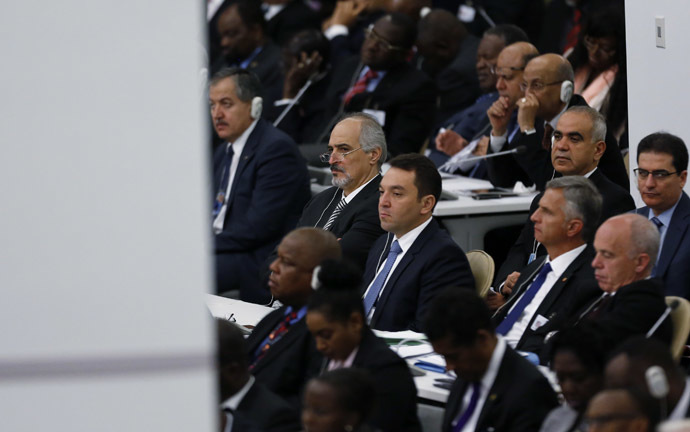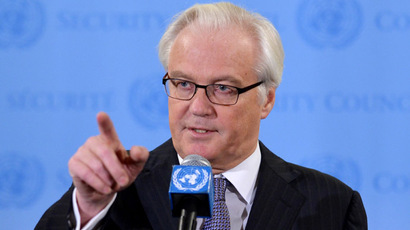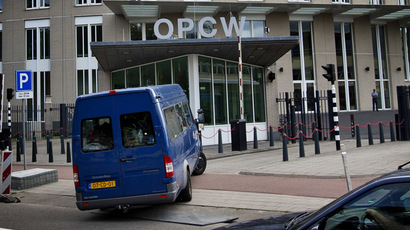Obama: World needs US to solve Syria, Iran crises
US President Barack Obama criticized the UN Security Council for inaction on Syria, and called for a diplomatic solution to the standoff with Iran, in a General Assembly speech that robustly defended America’s “exceptional” role in the world.
In front of a packed hall at the United Nations building in New York, Obama’s rhetoric alternated between moral justifications of America’s international interventions, and assurances that it is seeking a peaceful resolution to the world’s most pressing crises.
After declaring that doubting the Syrian government’s responsibility for the deadly chemical attack in Damascus on August 21 was an “insult to human reason,” Obama chastised the Security Council for “demonstrating no inclination to act at all.”
Russia, which has a veto in the Security Council, has said it believes that opposition forces, not the government of President Bashar Assad, ordered the toxic gas bombardment that the US says killed over 1,000 people.
In his speech, Obama criticized Russia and Iran for their insistence that Assad could stay on as the president after the civil war, saying it risked prolonging the 30-month conflict, and providing “a violent space for the extremists to operate.”
“A leader who slaughtered his citizens and gassed children to death cannot regain the legitimacy to lead a badly fractured country. The notion that Syria can somehow return to a pre-war status quo is a fantasy,” Obama said.
Obama did, however, welcome Syria’s compliance with the Russia-US plan to hand over its chemical weapons, saying the government has “taken a first step.”
But he emphasized that firm guarantees are now a must.
“There must be a strong Security Council resolution to verify that the Assad regime is keeping its commitments. And there must be consequences if they fail to do so.”
Any potential resolution looks uncertain, as diplomats have been quibbling behind the scenes over whether to officially assign blame for the chemical attack, and whether it opens the door for future foreign military intervention.
“If we cannot agree even on this, then it will show that the United Nations is incapable of enforcing the most basic of international laws,” Obama said.
The president said that the US had no plans to unleash its military might upon Syria, saying his mission has been to “shift away from a perpetual war footing” as the country withdraws its troops from Iraq and Afghanistan.
“I do not believe that military action by those within Syria or by external powers can achieve a lasting peace. Nor do I believe that America or any nation should determine who will lead Syria. That is for the Syrian people to decide,” Obama said.

His speech also signaled the culmination of diplomatic overtures between Washington and Iran’s new, more moderate leadership. Following a series of symbolic gestures from both sides in recent weeks, Obama and Iranian President Hassan Rouhani were expected to meet face-to-face on the sidelines of the UN General Assembly in what would be the first encounter between the two countries’ leaders since the 1979 Iranian Revolution (in the end the meeting did not take place, as it was "too complicated").
“I don’t believe our difficult history can be overcome overnight,” Obama said. “The suspicions run too deep. But I do believe that if we can resolve the issue of Iran’s nuclear program, that can serve as a major step down a long road toward a different relationship.”
During the two presidential terms of Mahmoud Ahmadinejad, the West accused Iran of trying to enrich uranium in the hope of eventually producing a nuclear weapon. Tehran has alternated between parading its nuclear program, and denying its military intent.
“America prefers to resolve our concerns over Iran’s nuclear program peacefully – although we are determined to prevent Iran from developing a nuclear weapon,” Obama said. “We are not seeking regime change, and we respect the right of the Iranian people to access peaceful nuclear energy.”
Throughout the speech, which also touched on the crisis in Egypt and the Palestinian-Israeli conflict, Obama switched between the general and the specific – outlining the thinking behind US initiatives, as much as the policies themselves.
Obama dismissed “the notion of American empire” as “propaganda,” and warned that calls for the US to stay out of international conflicts will only pave the way for more “mass atrocities.”
“The danger for the world is not an America that is too eager to immerse itself in the affairs of other countries, or to take on every problem in the region as its own,” he said.
“The danger for the world is that the United States, after a decade of war, rightly concerned about issues back home, aware of the hostility that our engagement in the region has engendered throughout the Muslim world, may disengage – creating a vacuum of leadership that no other nation is ready to fill.”
And while the US “needs to be modest in our belief that we can remedy every evil” and “mindful that the world is full of unintended consequences,” Obama reiterated that the US would not retreat from its international role, including on occasions when the “use of military force may be required to prevent the very worst from occurring.”
“I believe America is exceptional. In part because we have shown a willingness through the sacrifice of blood and treasure to stand up not only for our own narrow self-interest, but for the interest of all,” Obama said.















